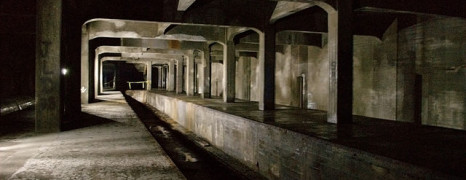“Portrait of a City” by Alexandra Spensley received first place in the 2015 Glazner Prize for Creative Writing contest, sponsored by SFUAD’s Creative Writing and Literature Department. Part I: Streets & Avenues The city receded like tidewater, brackish. I watched it slide. Metal accepted metal in a blur of ticking steel, urban heartbeats. Sidewalks swallowed themselves: unclean tongues roving through a city scorched sideways. Who will shoulder this weight? I am left with empty husks, the shadows of buildings ashen as roman carpets. Alone, I map my way through the rubbish: slabs of stone, loose teeth, a child’s violin splayed open and bleeding, red-eyed mice twisting in its hollow chest. I hung the city like wallpaper, then tore it in two— and it was not stitched from a paste of broken stars, not submerged in the hot sways of red dresses— no, the city was a cut-glass mobile, enthralling, suspended above a child’s eager hands. Part II: Harvests We knew we were done for when the newspaper said one-fourth of the houses in the eastern district now stood vacant, empty monuments to the past. That same newspaper had voted us best hardware store in the city for three nonconsecutive years—we had their dates on a plaque in the frosted-glass window out front—but who needs a hardware store when there’s no houses left? I started rearranging things. I moved the Phillips screwdrivers to aisle four and put most of the auto parts by the cash register. Nothing worked except positioning the blue paint-thinner jars in front of the window; this spiked sales for a few weeks before my conscience made me move everything back. Soon nearly everyone who came in was trying to tune up their cars for the long drive to a new house, buying gallon jars of oil and gas or trailer hitches for U-Hauls. When I asked them where they were moving to, they all mumbled something along the lines of “Oh, Barb and I are headed west” or “We’re taking the kids up north for high school”—indiscriminate, vague substitutes for “anywhere but here”. Outside, foreclosure signs sprouted like poppies in a pasture. Outside, the rain started. I thought we could struggle by on what we’d saved up from the good years, but when the generator busted ($5,000) and the roof started leaking ($6,000), I had no choice but to close the place down. I used all of our meager revenue from the past four months printing out huge black-and-red EVERYTHING MUST GO signs, hung them out front next to the posters of angry-eyed kids with ‘missing, desperacido‘typed in block letters on top. There were dozens of those missing posters—I pasted each one I found; I just couldn’t stand those kids’ eyes. My wife suggested that we move out after closing shop, let our house become another shuttered tomb in the sea of a dying city. I told her no, I couldn’t release this land after so many years of holding it— so long that it had bloomed roots around my tired wrists. Still, the sight of the grocery on Sunday pierced me: washed-out high school kids, coughing up cigarettes in the parking lot; shelves heavy with a lack of bread; the thick, tangible seep of money right into the greedy earth. Gone. In the end, we couldn’t sell everything in the shop and drove it to the town dump instead; we needed three full pickup beds to move it all. Paradoxically, the dump seemed to be the liveliest place in the city: laughing, tanned men in cutoff shirts, cheerily tossing mountains of metal screws and power drills into the gaping tongue of a trash compressor. The leather of the pickup’s passenger seat stuck tight to my thighs; soon, summer would be here. In the rearview mirror, I watched the men heave trash bags over their shoulders like insect cocoons full to bursting, like a reaping of...


 Jackalope Magazine is the student magazine of Santa Fe University of Art and Design. Building on the interdisciplinary nature of our education, we aim to showcase the talent of our university and character of our city.
Jackalope Magazine is the student magazine of Santa Fe University of Art and Design. Building on the interdisciplinary nature of our education, we aim to showcase the talent of our university and character of our city.
Recent Comments